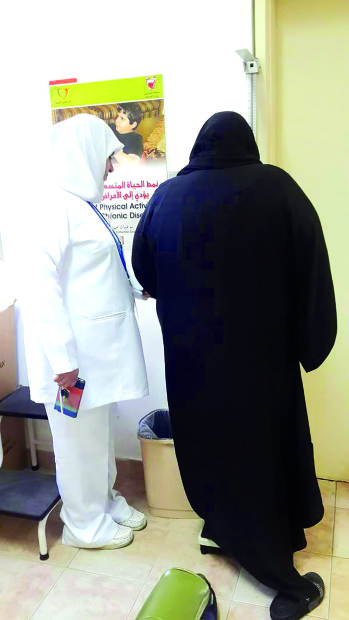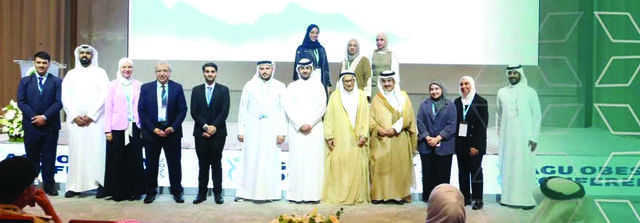Women and children are more likely to engage in emotional eating as a result of stress caused by societal and academic expectations and social media, a doctor has revealed.
People who eat for emotional reasons often gain too much weight, putting them at a greater risk for obesity, type 2 diabetes, heart disease, high blood pressure, stroke and cancer, Arabian Gulf University (AGU) Psychiatry department assistant professor and consultant psychiatrist Dr Haitham Jahrami said.
He was speaking on the sidelines of the AGU Obesity Conference, which kicked off on Thursday at the Crowne Plaza Bahrain, Manama.
The two-day forum that ended yesterday was held in the presence of Supreme Council for Health (SCH) chairman Lieutenant General Dr Shaikh Mohammed bin Abdulla Al Khalifa. It brought together medical professionals from Bahrain and around the world to discuss the rising cases of obesity, which affects more than 36 per cent of adults in Bahrain.
Dr Jahrami said women were more likely to engage in emotional eating or unhealthy eating habits as they take care of household needs and children, which can lead to psychological stress in the long term.
“Women are usually the ones cooking and preparing the meals at home,” he said, adding that by the time they finish their household chores, they may no longer be hungry, and these kinds of habits can manifest in unhealthy eating patterns or disordered eating.

A patient’s weight being checked at a facility in Bahrain
“This stress impacts both the body and mind, which can lead to chronic conditions such as obesity,” he said.
Dr Jahrami added that children were just as likely to engage in emotional eating due to academic pressures and social media overload.
“Many parents these days are placing unrealistic academic pressure on their children which is leading them to experience stress,” he said, adding that during such occasions, the body releases cortisol, a hormone that helps the body protect itself.
“If cortisol levels are elevated for a prolonged period of time, this can lead to increased food consumption, fat storage and weight gain.
“Many times, children will keep quiet about their stress and anxiety, so their emotions go unregulated, which leads to worsening eating habits.
“According to research, 60 per cent of adolescents globally report moderate-to-severe-stress, with 30pc of those being obese.”
To combat these trends, he suggested increasing the number of women’s support groups to give them an outlet to talk about their emotions.
“Schools should also introduce more classes and workshops about emotional resilience and mental health regulation,” he said, citing a campaign in Qatar to promote healthy lifestyles among children, which resulted in 15pc reduction in obesity rates.
“We should also utilise artificial intelligence (AI) and other applications to provide an outlet to those who need immediate help,” he added.

Lt Gen Dr Shaikh Mohammed with AGU officials and dignitaries at the conference
Bahrain’s obesity prevalence is higher than the regional average of 10.3pc for women and 7.5pc for men.
A body mass index over 25 is considered overweight and over 30 is obese. Overweight and obesity result from an imbalance of energy intake (diet) and energy expenditure (physical activity).
During the conference’s opening ceremony, AGU president Dr Saad Al Fuhaid highlighted that global advancements have placed increasing pressure on healthcare systems, not only in Bahrain, but across the world.
“Lifestyle shifts and growing reliance on unhealthy dietary habits have caused obesity rates to reach unprecedented levels, which poses a serious threat to public health, given the strong links between obesity and chronic illnesses such as diabetes, cardiovascular disease and others,” he said.
“These alarming trends place a collective responsibility upon us all to promote scientific research, public awareness and health education to mitigate risks.
“I hope this gathering of distinguished scholars and researchers will provide a valuable opportunity for sharing expertise, exploring new theories and advancing our efforts to tackle rising obesity rates.”
Panel discussions on the first day included, The Science of Hunger: Understanding Appetite Regulation, The Genetics and Epigenetics of Obesity: Unraveling the Complexities of Heritability, Psychosocial Factors and Obesity: Stress, Emotion and Eating Behaviours and Obesity and Cardiovascular Disease: A Complex Relationship.
Yesterday’s session’s covered topics such as Management of Post Bariatric Hypoglycemia: GCC consensus statement, Understanding The Obesity Epidemic in the GCC and Strengthening GCC Collaboration for Obesity Prevention: A Gulf CDC Perspective and National Efforts and Action Against Obesity in Bahrain.


&uuid=(email))